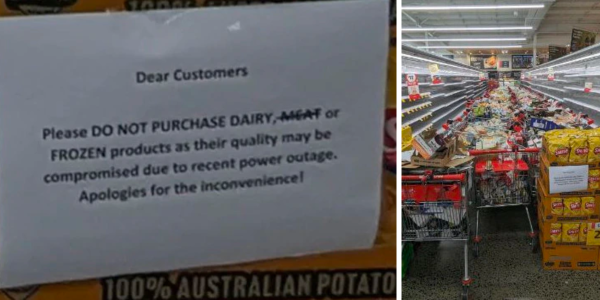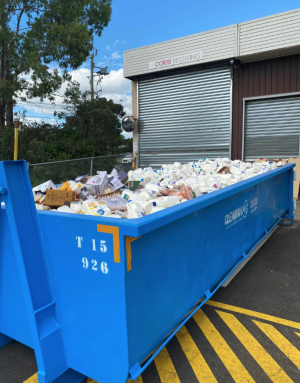Power outage causes supermarkets to dump a staggering amount of fresh produce: 'Such a shame to see this much going to waste'
By
VanessaC
- Replies 24
The recent power outages in Victoria have not only left hundreds of thousands of Australians in the dark but have also led to a heartbreaking scene in supermarkets across the state.
The power outages have resulted in thousands of dollars worth of fresh produce being deemed 'unsafe' for sale and dumped in industrial bins outside supermarkets.
The incident, which occurred after a severe storm disrupted power supply in the area, has sparked a heated debate about food wastage and the need for better contingency plans.
A poignant note posted in one of the affected stores read, 'Please do not purchase dairy, meat or frozen products as their quality may be compromised due to recent power outage.'
'Apologies for the inconvenience!'
The aftermath of the power outage was still evident on Wednesday morning, with one Victorian resident reporting that their local stores were still 'empty'.
They shared their experience on social media, stating, 'All dairy, fancy cheese, and meat [are] all gone. Our power was off from like 3:45 pm until 12:30 am, so it was off for quite a while and pretty warm outside.'
A photograph of the 'skip full of milk' was also posted online by a shopper, triggering a wave of reactions.
Many expressed dismay at the sight of such a large quantity of milk going to waste.
'Such a shame to see this much milk going to waste,' one said.
However, a person claiming to work in the dairy industry commented that a 'lot more gets wasted every day'.
While the sight of wasted milk is indeed distressing, it's important to understand the broader context.
The dairy industry, like many other sectors, operates on a delicate balance of supply and demand.
Any disruption, such as a power outage, can tip the scales and lead to wastage, as seen in a Woolworths store after a power outage in 2022.
Retail Expert Professor Gary Mortimer, however, disagreed with the dairy worker's comment.
'From my experience, milk was one product that would be rarely wasted,' Professor Mortimer said.
'The high turnover nature of the product means supermarkets would rarely mark down or dispose of milk.'
He further explained that every player in the supply chain would strive to reduce waste as it directly impacts their profits.
'Logistics and transport companies would want to maintain the cold chain, to reduce waste, and therefore loss.'
'Producers, equally would want to reduce waste—again, because waste during production and bottling would erode their profits.'
'The same would hold for supermarkets. Today, supermarkets use highly advanced inventory systems to ensure highly perishable products are not over-ordered.'
Australian supermarkets are also required to adhere to strict health and safety regulations, including keeping fresh food such as meat and dairy at a certain temperature to avoid spoilage. If they cannot be kept at a certain temperature, they cannot be sold and must be discarded.
A Coles spokesperson confirmed that around 30 stores across Victoria lost power during the recent wild weather.
'All of our stores are now back open, and our team is working hard today to restock our shelves, so we can continue to serve the community,' the spokesperson said.
While most stores were able to resume operations quickly, some were without power for longer, leading to the unfortunate disposal of food.
'At Coles, food safety is paramount—and unfortunately, the food we are disposing of is unsafe for sale or to be donated to food rescue charities.'
Woolworths, another major supermarket chain, also reported power outages at more than 30 of its stores due to the unexpected storm.
'Given the evolving situation, we’re currently operating six other stores by generators. Stores throughout the worst affected areas (Gippsland, Dandenong) may trade with restricted hours due to limited generator capacity,' a spokesperson from Woolworths said.
'It’s expected we’ll need to discard a number of refrigerated products, including dairy, poultry, milk and frozen food. This is in keeping with strict food safety protocols.'
Stores running on generators will reportedly not receive any refrigerated deliveries until their main power supply returns to normal.
Customers were advised to check their supermarket’s website or Google to stay updated with the store’s trading hours.
Restoration and clean-up efforts in Victoria continue today after almost 530,000 homes lost power on Tuesday due to the unexpected powerplant shutdown.
More than 80,000 homes and businesses are reportedly still without power as repair crews work to fix the powerlines destroyed by the severe winds and storms that swept across the state.

Our thoughts are with those affected by the recent storm. We hope you are all safe.
Members, what are your thoughts on this issue? Have you witnessed similar incidents of food wastage? Share your thoughts and experiences in the comments below.
The power outages have resulted in thousands of dollars worth of fresh produce being deemed 'unsafe' for sale and dumped in industrial bins outside supermarkets.
The incident, which occurred after a severe storm disrupted power supply in the area, has sparked a heated debate about food wastage and the need for better contingency plans.
A poignant note posted in one of the affected stores read, 'Please do not purchase dairy, meat or frozen products as their quality may be compromised due to recent power outage.'
'Apologies for the inconvenience!'
The aftermath of the power outage was still evident on Wednesday morning, with one Victorian resident reporting that their local stores were still 'empty'.
They shared their experience on social media, stating, 'All dairy, fancy cheese, and meat [are] all gone. Our power was off from like 3:45 pm until 12:30 am, so it was off for quite a while and pretty warm outside.'
A photograph of the 'skip full of milk' was also posted online by a shopper, triggering a wave of reactions.
Many expressed dismay at the sight of such a large quantity of milk going to waste.
'Such a shame to see this much milk going to waste,' one said.
However, a person claiming to work in the dairy industry commented that a 'lot more gets wasted every day'.
While the sight of wasted milk is indeed distressing, it's important to understand the broader context.
The dairy industry, like many other sectors, operates on a delicate balance of supply and demand.
Any disruption, such as a power outage, can tip the scales and lead to wastage, as seen in a Woolworths store after a power outage in 2022.
Retail Expert Professor Gary Mortimer, however, disagreed with the dairy worker's comment.
'From my experience, milk was one product that would be rarely wasted,' Professor Mortimer said.
'The high turnover nature of the product means supermarkets would rarely mark down or dispose of milk.'
He further explained that every player in the supply chain would strive to reduce waste as it directly impacts their profits.
'Logistics and transport companies would want to maintain the cold chain, to reduce waste, and therefore loss.'
'Producers, equally would want to reduce waste—again, because waste during production and bottling would erode their profits.'
'The same would hold for supermarkets. Today, supermarkets use highly advanced inventory systems to ensure highly perishable products are not over-ordered.'
Australian supermarkets are also required to adhere to strict health and safety regulations, including keeping fresh food such as meat and dairy at a certain temperature to avoid spoilage. If they cannot be kept at a certain temperature, they cannot be sold and must be discarded.
A Coles spokesperson confirmed that around 30 stores across Victoria lost power during the recent wild weather.
'All of our stores are now back open, and our team is working hard today to restock our shelves, so we can continue to serve the community,' the spokesperson said.
While most stores were able to resume operations quickly, some were without power for longer, leading to the unfortunate disposal of food.
'At Coles, food safety is paramount—and unfortunately, the food we are disposing of is unsafe for sale or to be donated to food rescue charities.'
Woolworths, another major supermarket chain, also reported power outages at more than 30 of its stores due to the unexpected storm.
'Given the evolving situation, we’re currently operating six other stores by generators. Stores throughout the worst affected areas (Gippsland, Dandenong) may trade with restricted hours due to limited generator capacity,' a spokesperson from Woolworths said.
'It’s expected we’ll need to discard a number of refrigerated products, including dairy, poultry, milk and frozen food. This is in keeping with strict food safety protocols.'
Stores running on generators will reportedly not receive any refrigerated deliveries until their main power supply returns to normal.
Customers were advised to check their supermarket’s website or Google to stay updated with the store’s trading hours.
Restoration and clean-up efforts in Victoria continue today after almost 530,000 homes lost power on Tuesday due to the unexpected powerplant shutdown.
More than 80,000 homes and businesses are reportedly still without power as repair crews work to fix the powerlines destroyed by the severe winds and storms that swept across the state.
Key Takeaways
- Severe storms in Victoria have caused widespread power outages, impacting over 60 Coles and Woolworths supermarkets and causing substantial food wastage.
- Images shared online illustrated the extent of the wasted products, with items filling up skip bins and blocking supermarket aisles.
- Both Coles and Woolworths stressed the importance of food safety, with Coles commenting on the unfortunate but necessary disposal of unsafe food and Woolworths operating some stores using generators with limited capacity.
- More than 80,000 homes and businesses across the state are reportedly still without power.
Members, what are your thoughts on this issue? Have you witnessed similar incidents of food wastage? Share your thoughts and experiences in the comments below.









